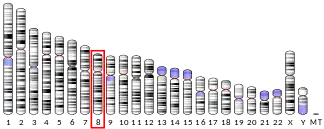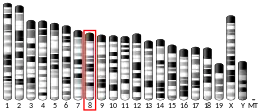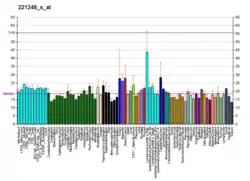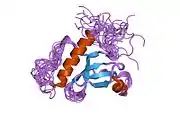| NSD3 | |||||||||||||||||||||||||||||||||||||||||||||||||||
|---|---|---|---|---|---|---|---|---|---|---|---|---|---|---|---|---|---|---|---|---|---|---|---|---|---|---|---|---|---|---|---|---|---|---|---|---|---|---|---|---|---|---|---|---|---|---|---|---|---|---|---|
 | |||||||||||||||||||||||||||||||||||||||||||||||||||
| |||||||||||||||||||||||||||||||||||||||||||||||||||
| Identifiers | |||||||||||||||||||||||||||||||||||||||||||||||||||
| Aliases | NSD3, pp14328, WHSC1L1, WHISTLE, Wolf-Hirschhorn syndrome candidate 1-like 1, nuclear receptor binding SET domain protein 3, KMT3G, KMT3F | ||||||||||||||||||||||||||||||||||||||||||||||||||
| External IDs | OMIM: 607083 MGI: 2142581 HomoloGene: 56960 GeneCards: NSD3 | ||||||||||||||||||||||||||||||||||||||||||||||||||
| |||||||||||||||||||||||||||||||||||||||||||||||||||
| |||||||||||||||||||||||||||||||||||||||||||||||||||
| |||||||||||||||||||||||||||||||||||||||||||||||||||
| |||||||||||||||||||||||||||||||||||||||||||||||||||
| |||||||||||||||||||||||||||||||||||||||||||||||||||
| Wikidata | |||||||||||||||||||||||||||||||||||||||||||||||||||
| |||||||||||||||||||||||||||||||||||||||||||||||||||
Histone-lysine N-methyltransferase NSD3 is an enzyme that in humans is encoded by the WHSC1L1 gene.[5][6]
This gene is related to the Wolf–Hirschhorn syndrome candidate-1 gene and encodes a protein with PWWP (proline-tryptophan-tryptophan-proline) domains. The function of the protein has not been determined. Two alternatively spliced variants have been described.[6]
The WHSC1L1 gene is amplified in several cancers, including lung cancer and head and neck cancer, and may play a role in carcinogenesis.[7][8]
References
- 1 2 3 GRCh38: Ensembl release 89: ENSG00000147548 - Ensembl, May 2017
- 1 2 3 GRCm38: Ensembl release 89: ENSMUSG00000054823 - Ensembl, May 2017
- ↑ "Human PubMed Reference:". National Center for Biotechnology Information, U.S. National Library of Medicine.
- ↑ "Mouse PubMed Reference:". National Center for Biotechnology Information, U.S. National Library of Medicine.
- ↑ Stec I, Nagl SB, van Ommen GJ, den Dunnen JT (Jun 2000). "The PWWP domain: a potential protein-protein interaction domain in nuclear proteins influencing differentiation?". FEBS Lett. 473 (1): 1–5. doi:10.1016/S0014-5793(00)01449-6. PMID 10802047. S2CID 26290698.
- 1 2 "Entrez Gene: WHSC1L1 Wolf-Hirschhorn syndrome candidate 1-like 1".
- ↑ Kang, D; Cho, HS; Toyokawa, G; Kogure, M; Yamane, Y; Iwai, Y; Hayami, S; Tsunoda, T; Field, HI; Matsuda, K; Neal, DE; Ponder, BA; Maehara, Y; Nakamura, Y; Hamamoto, R (Feb 2013). "The histone methyltransferase Wolf-Hirschhorn syndrome candidate 1-like 1 (WHSC1L1) is involved in human carcinogenesis". Genes, Chromosomes & Cancer. 52 (2): 126–39. doi:10.1002/gcc.22012. PMID 23011637. S2CID 41047322.
- ↑ Chen, Y; McGee, J; Chen, X; Doman, TN; Gong, X; Zhang, Y; Hamm, N; Ma, X; Higgs, RE; Bhagwat, SV; Buchanan, S; Peng, SB; Staschke, KA; Yadav, V; Yue, Y; Kouros-Mehr, Hosein (2014). "Identification of Druggable Cancer Driver Genes Amplified across TCGA Datasets". PLOS ONE. 9 (5): e98293. Bibcode:2014PLoSO...998293C. doi:10.1371/journal.pone.0098293. PMC 4038530. PMID 24874471.
Further reading
- Angrand PO, Apiou F, Stewart AF, et al. (2001). "NSD3, a new SET domain-containing gene, maps to 8p12 and is amplified in human breast cancer cell lines". Genomics. 74 (1): 79–88. doi:10.1006/geno.2001.6524. PMID 11374904.
- Stec I, van Ommen GJ, den Dunnen JT (2001). "WHSC1L1, on human chromosome 8p11.2, closely resembles WHSC1 and maps to a duplicated region shared with 4p16.3". Genomics. 76 (1–3): 5–8. doi:10.1006/geno.2001.6581. PMID 11549311.
- Rosati R, La Starza R, Veronese A, et al. (2002). "NUP98 is fused to the NSD3 gene in acute myeloid leukemia associated with t(8;11)(p11.2;p15)". Blood. 99 (10): 3857–60. doi:10.1182/blood.V99.10.3857. PMID 11986249.
- Strausberg RL, Feingold EA, Grouse LH, et al. (2003). "Generation and initial analysis of more than 15,000 full-length human and mouse cDNA sequences". Proc. Natl. Acad. Sci. U.S.A. 99 (26): 16899–903. Bibcode:2002PNAS...9916899M. doi:10.1073/pnas.242603899. PMC 139241. PMID 12477932.
- Ota T, Suzuki Y, Nishikawa T, et al. (2004). "Complete sequencing and characterization of 21,243 full-length human cDNAs". Nat. Genet. 36 (1): 40–5. doi:10.1038/ng1285. PMID 14702039.
- Gerhard DS, Wagner L, Feingold EA, et al. (2004). "The status, quality, and expansion of the NIH full-length cDNA project: the Mammalian Gene Collection (MGC)". Genome Res. 14 (10B): 2121–7. doi:10.1101/gr.2596504. PMC 528928. PMID 15489334.
- Tonon G, Wong KK, Maulik G, et al. (2005). "High-resolution genomic profiles of human lung cancer". Proc. Natl. Acad. Sci. U.S.A. 102 (27): 9625–30. Bibcode:2005PNAS..102.9625T. doi:10.1073/pnas.0504126102. PMC 1160520. PMID 15983384.
- Kim SM, Kee HJ, Eom GH, et al. (2006). "Characterization of a novel WHSC1-associated SET domain protein with H3K4 and H3K27 methyltransferase activity". Biochem. Biophys. Res. Commun. 345 (1): 318–23. doi:10.1016/j.bbrc.2006.04.095. PMID 16682010.
This article is issued from Wikipedia. The text is licensed under Creative Commons - Attribution - Sharealike. Additional terms may apply for the media files.






